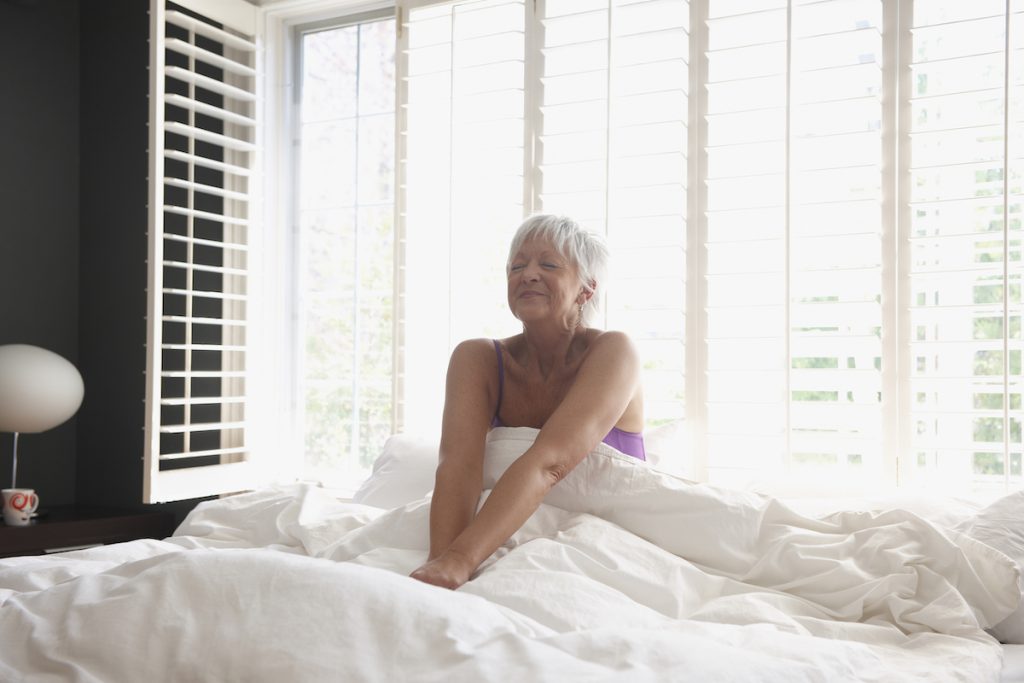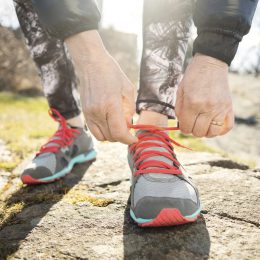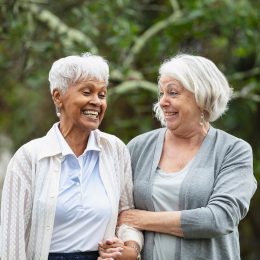Sleep and Healthy Aging: The SilverSneakers Guide
A good night’s rest can make you happier and healthier. But quality sleep gets tougher as you age. Here’s what’s going on — plus tips to get more Zs.

Chances are you’ve had many sleepless nights in your life. Finals week in college. The first few months of caring for a newborn. All those night shifts you pulled at work.
So it may seem ironic — now that you’re older and may have more time to sleep in — that you’re not able to drift off to dreamland like you once did.
Alas, it’s not uncommon for adults over age 65 to sleep more poorly than they once did. It’s thanks, in part, to changes in our circadian rhythm and brain chemistry as we age.
“Just as your hair changes color as you get older, your sleep changes as well,” says Aatif M. Husain, M.D., the division chief of epilepsy, sleep, and neurophysiology at Duke University School of Medicine. “There’s no reason why the rest of your body would change, and you’d expect your sleep wouldn’t.”
But that doesn’t mean you’re destined for sleepless nights forever — just that you may have to take a few extra steps to get the amount of sleep you need. Here’s what you need to know to get back to sleeping through the night.
How much sleep do you really need if you’re over 65?
Contrary to popular belief, older adults still need seven to eight hours of sleep, the same recommended amount for younger adults. The problem is, those seven to eight hours don’t come as easily as they once did.
The reason: As we get older, we naturally spend less time in slow-wave sleep, a type of deep, restorative stage of shut-eye. Instead, we spend more time in the light sleep stage. This is also why we also tend to wake up more often in the middle of the night — on average, three or four times a night.
“You don’t feel as refreshed in light sleep, and that’s why people might feel that their sleep quality might change,” says Dr. Husain.
What are the physical benefits of getting enough sleep?
Here’s what happens when you log at least seven hours of sleep a night.
You lower your risk of developing diabetes and heart disease. Your blood pressure drops as you sleep, Dr. Husain explains. But interrupted sleep or nights spent tossing and turning means your blood pressure stays elevated. That can put you at an increased risk of a heart attack or stroke.
Short-changing your sleep needs also makes it harder for your body to regulate blood sugar (glucose). And that can lead to diabetes.
You strengthen your immune system. Sleep helps your body repair cells that play a crucial role in its immune response. That means you’ll likely get fewer colds. Vaccines also may not work as well when you’re short on sleep, vaccines may not work as well.
Your reaction time and coordination improve. That’s good for driving and keeping up with Zumba or Line Dancing choreography. Good sleep boosts your thinking skills, too — everything from attention, creativity and memory to faster response times.
You’re less likely to gain weight. During sleep, the body regulates the hormones that control feelings of hunger and fullness. When you’re not sleeping well, the levels of these hormones get knocked off balance. That can lead to overeating and poor food choices.
What are the emotional benefits of getting enough sleep?
There’s a reason why a good night’s sleep feels so, well, good. The area of the brain that’s involved in mood regulation, the amygdala, uses your sleep time to help your brain process thoughts and feelings in a more positive way.
Now you know why you’re more likely to be irritable the day after a poor night’s rest.
That’s not all. One review in BMC Psychiatry found that people with insomnia — which is when you have trouble falling asleep and staying asleep — were twice as likely to develop depression as those who didn’t have insomnia. What’s more, poor sleep can make symptoms of diagnosed depression and anxiety worse.
Too little shut eye can also cause the classic signs of brain fog, including memory problems or forgetfulness.
Sleep even plays a role in the risk of dementia. The brain uses the deep sleep stage to flush out toxins. Researchers believe this helps prevent waste buildup that may be a factor in causing Alzheimer’s.
Recommended FREE SilverSneakers On-Demand Workout: Tai Chi for Better Sleep
What are the most common reasons older adults don’t get enough sleep?
As we get older, our body’s internal clock (circadian rhythm) also changes.
“People tend to fall asleep a bit sooner, but they aren’t able to sleep as long,” says Dr. Husain. Our levels of melatonin, a sleep hormone, drop with age, which can keep us from getting enough sleep.
Older adults are also more prone to sleep problems than younger adults, including:
Insomnia. Insomnia is the most common sleep problem among adults over the age of 60, affecting about 50 percent of older adults. Health conditions like chronic pain, heart disease, cancer, and depression may be to blame for many insomnia cases, according to a 2018 review.
Obstructive sleep apnea (OSA). It’s a disorder that causes you to stop breathing for a few seconds while you sleep, sometimes 30 times or more each hour. The part of the airway that keeps our tongue from collapsing weakens with age, according to a study in the journal Sleep. When it does collapse during sleep, it blocks our ability to breathe.
Restless legs syndrome. Older adults are about 2 to 3 times more likely to have restless legs syndrome (RLS) than younger adults, according to a 2019 study. It’s a creeping, uncomfortable urge to move your legs, usually while you’re lying down. Experts aren’t quite sure what causes RLS, though it seems to be more prevalent in people who have certain conditions like arthritis and diabetes, which can also affect older adults.
Nocturia. Find yourself waking up more often in the middle of the night to use the bathroom? There’s a name for that: nocturia. It’s a condition that affects about 54% of women and 63% of men aged 65 and older, according to a study in the Journal of the American Geriatrics Society. Not only are older adults more likely to have nocturia[1]day.
Health conditions. Conditions such arthritis can make it difficult not only to fall asleep but to stay asleep, in part because the pain can rouse you awake, says Dr. Husain. In older men, an enlarged prostate can cause an urgent need to pee in the middle of the night, which can interfere with your shut-eye.
And conditions like asthma, GERD, and migraine can worsen the symptoms of insomnia, according to a 2018 review in the Journal of Clinical Sleep Medicine. Mental health conditions like depression and anxiety, which also tend to become more common with age, can also increase the odds of insomnia, he says.
Medications. Certain antidepressants, beta-blockers, steroids, and thyroid supplements are some of the medications that may make it harder to sleep well.
When should you talk to a doctor about sleep problems?
Everyone has the occasional rough night of sleep. But if you’ve been having trouble nodding off or staying asleep for two or three weeks, you may have a sleep disorder or other health condition. That warrants a call to your doctor.
Even if you think you’re sleeping enough at night, showing signs of sleep deprivation during the day could also be a sign of a sleep problem. This might look like waking up with a headache or nodding off while you’re watching television.
You should call your doctor if you suspect you have a sleep condition like sleep apnea or restless legs syndrome. While the signs of sleep apnea can be hard to spot yourself, your partner may be able to clue you in. Some symptoms include snoring and experiencing pauses in your breathing, says Dr. Husain.
Subscribe to our newsletter
It's quick and easy. You could be one of the 13 million people who are eligible.
Already a member? Click to discover our 15,000+ participating locations.
Follow Us
Recommended reading: 6 Subtle Signs You’re Sleep Deprived — and Why It Matters
What is good sleep hygiene?
Think of good sleep hygiene as good sleep habits. It encompasses all the strategies you can use to help you nod off quicker and sleep longer throughout the night. Here are some lifestyle habits that can improve your sleep:
- Stick to a sleep schedule. Going to bed and waking up in the morning at the same time— even on the weekends — can help regulate your circadian rhythm. This makes it easier to sleep over time, says Dr. Husain.
- Avoid caffeine late in the day. It sounds obvious, but caffeine can lurk in more than just coffee, soda and tea. You can also find it in appetite suppressants, supplements, decongestants and certain asthma medications.
- Keep your bedroom cool. The ideal sleep temperature for most people is between 60- and 67-degrees Fahrenheit. 
- Stay off your phone. Like to read before bed? Pick up a book (as in, a print one) and use a small, bedside lamp to light the pages. A study published in 2021 suggests that the artificial light from digital devices can reduce the time we spend in short-wave sleep. Using a blue-light filter on your screen may partially (though not completely) offset some sleep disruptions. If you absolutely can’t sleep without your phone, at least switch it to the night mode setting.
- Avoid alcohol before bed. Drinking a glass of wine may help you nod off. But a few hours later, alcohol can have a stimulating effect, waking you up from your sleep, says Dr. Husain. If you like to unwind with a drink at the end of the day, try to finish it at least four hours before bed.
- Know when to give up. It’s hard to fall asleep when you’re too busy staring up at the ceiling, wondering if you’re ever going to fall asleep. If you can’t nod off within 20 minutes of going to bed, leave the room and do something else relaxing, like reading or meditating, until you feel tired enough to fall asleep.
How can exercise help improve sleep?
Studies show that exercise, especially strength training and walking, is linked to better, longer sleep in older adults, according to a review published in Current Sleep Medicine Reports.
It’s thought that being more active — and burning more calories — during the day will help you rest easier at night. But exercise can also help ease anxiety and act as a kind of natural antidepressant, which may help ward off insomnia, according to the review. Then, there’s the theory that exercise can trigger an increase in body temperature. Afterward, as the body cools down, people tend to become more tired.
Any exercise is likely better than no exercise at all. In the past, experts used to tell people to avoid working out at the end of the day, but that may be outdated thinking. Some research in the journal Sleep Medicine suggests that, contrary to keeping people awake at night, exercising in the evening may in fact help people sleep better.
That said, you may want to stop working out right before bedtime. The same review found that doing vigorous workouts at least an hour before falling asleep could interfere with your sleep. It’s likely because this type of exercise increases your heart rate, making it harder to nod off.
Recommended reading: Take the 7-Day Sleep Challenge
What do older adults need to know about melatonin and over-the-counter sleep supplements?
It’s true that our levels of melatonin naturally decrease with age, but that doesn’t necessarily mean you should try it in supplement form without talking to your doctor first.
“You have micromilligram levels of melatonin in your brain, so even when you take a small dose of 1 milligram, you’re taking way more melatonin than your brain is actually producing,” says Dr. Husain. Most people take much more than that, in 5- to 10-milligram doses (although not all of that melatonin will reach will your brain, he says).
Taking between 1 and 10 milligrams of melatonin can help you fall asleep faster — usually within an hour, he says. Taking less than 1 milligram can help regulate your circadian rhythm.
Melatonin is generally considered safe, but it does have some possible side effects. These include headaches, nausea, dizziness and drowsiness. The supplement can also interfere with certain medications, like those for diabetes and bloopressure. As always, talk to your doctor before taking a new over-the-counter medication or supplement.
Recommended reading: 5 Myths and Truths About Melatonin and Sleep Meds
See our sources:
Recommended hours of sleep by age: Centers for Disease Control and Prevention
Sleep hygiene: MedlinePlus
How older adults can sleep well: National Institute on Aging
Study on insomnia in older adults: Journal of Clinical Sleep Medicine
How sleep changes as we age: MedlinePlus
Link between sleep and chronic disease: Centers for Disease Control and Prevention
Sleep disorders overview: Cleveland Clinic
Study on obstructive sleep apnea in older adults: Sleep
Study on restless legs syndrome in older adults: Drugs & Aging
Nocturia overview: Cleveland Clinic
The best temperature for sleep: Sleep Foundation
Tips for better sleep: Mayo Clinic
How exercise impacts sleep: Current Sleep Medicine Reports
Melatonin overview: Mayo Clinic
Check Your SilverSneakers Eligibility Instantly
SilverSneakers members can go to thousands of nationwide gyms and fitness locations, plus take SilverSneakers LIVE online classes that are designed for all fitness levels and abilities. If you have a Medicare Advantage plan, it may include SilverSneakers—at no additional cost. Check your eligibility instantly here.
Not eligible for SilverSneakers? You can still get 200+ free SilverSneakers On-Demand videos and stay in touch with us by creating your online account.





